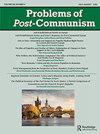中欧和东欧的移民政治化:来自两个国家全体会议辩论的证据
IF 2
2区 社会学
Q2 POLITICAL SCIENCE
引用次数: 0
摘要
摘要 有关移民问题政党政治化的研究几乎都集中在西欧国家。为了解决中欧和东欧国家缺乏移民问题政党政治化(以下理解为突出性)研究的问题,我们调查了捷克和斯洛伐克在 2013 年至 2017 年间的所有议会演讲。从描述性角度看,我们发现在2015年难民危机之前,移民问题几乎不为人所知。在解释层面上,我们表明,政党在GAL-TAN维度中的TAN极位置、欧洲怀疑论立场和政府参与使议员更有可能将移民政治化。本文章由计算机程序翻译,如有差异,请以英文原文为准。
Politicisation of Immigration in Central and Eastern Europe: Evidence from Plenary Debates in Two Countries
ABSTRACT The research on the party politicization of immigration almost exclusively focuses on West European countries. To address the lack of studies of party politicization (hereafter understood as salience) of immigration in Central and East European countries, we investigate all the parliamentary speeches in Czechia and Slovakia between 2013 and 2017. Descriptively, we show that immigration was almost invisible before the 2015 refugee crisis. On the explanatory level, we show that party placement toward the TAN-pole of the GAL–TAN dimension, Eurosceptic positions, and government participation make it more likely for parliamentarians to politicize immigration.
求助全文
通过发布文献求助,成功后即可免费获取论文全文。
去求助
来源期刊

Problems of Post-Communism
POLITICAL SCIENCE-
CiteScore
4.00
自引率
12.50%
发文量
33
期刊介绍:
The post-communist countries are the most rapidly changing societies of Europe and Asia. For insight into this twenty-first century revolution, there is no better source than Problems of Post-Communism. Emphasis is placed on timely research covering current economic, political, security, and international developments and trends in Russia and China, Central Europe and Central Asia, Latin America, and Southeast Asia. Clarity and readability make the articles fully accessible to researchers, policy makers, and students alike.
 求助内容:
求助内容: 应助结果提醒方式:
应助结果提醒方式:


